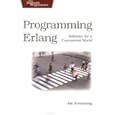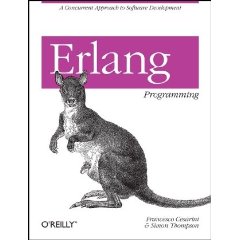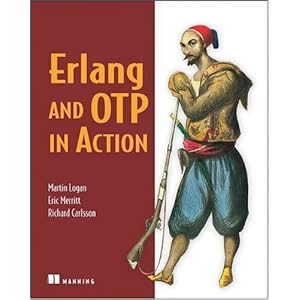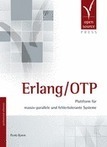Archive
Interesting stuff to read about #erlang
Hello there!
Even though I haven’t been writing in this blog very much during the last moths, I had the chance to read many new (and old) interesting blog posts, articles and tutorial about Erlang.
Some of the stuff I had the chance to read was really well done and inspiring, therefore I would like to share these contents with you. In this blog post of mine I am going to make a list of the 4 articles that I loved most, with a brief description for each of team. Let’s start then!
Interesting Erlang stuff you should take a look at!
Here is my brief list; as I did in one of my previous blog posts I would like to remember that the order of the links is totally random!
- Create and Deploy Your Erlang/Cowboy Application on Heroku in 30 Minutes: In this blog post, Roberto Aloi explains how to create and deploy easily a web application written using Erlang and Cowboy. I liked this article very much: Roberto is one of the most famous Erlangers out there and even though the application he presents is really easy it’s always a pleasure to read some of his code. Moreover the part related to deploy focuses on Heroku the well known cloud platform, showing how easy it is to deploy our Erlang application there.
- Continuous Integration for Erlang With Travis-CI: continuous integration (CI) is a powerful tool. While I was searching for a good CI service to be used with one of my Erlang projects I ended up reading this nice blog post by Ward Bekker. In his tutorial Ward explains briefly what are the main tool we have in Erlang to automate our tests and teaches how to connect a public GitHub repository to Travis-CI. I really liked this blog post, and if you are new to CI I suggest you to read as well this article by Martin Fowler: Continuous Integration.
- Meck and Eunit Best Practices: TDD and testing in general are one of the things I am trying to learn more in these months. Even though this post by David Reid is not very recent (2011) I suggest you to read it if you want to learn more about Meck, the most famous Erlang mocking library written by Adam Lindberg. Once more, if you are new to mocking and so on, I suggest you once more to read a great article by Martin Fowler: Mocks Aren’t Stubs.
- A Week with Elixir: That’s true, Elixir is not Erlang, but I think we all should read what the great Joe Armstrong thinks about this new interesting language written by José Valim. In his blog post Joe gives his impressions about Elixir and its syntax, providing code samples and really wonderful insights. If you want to know more about Elixir you can go to the official web page or consider buying this book by Dave Thomas.
And that’s all folks! I hope you will enjoy these stuff as much as I did!
An interview with Roberto Aloi (@robertoaloi)
In this post we will go on with the series of interviews I had to chance to have with my favourite erlangers. Today you will read Roberto Aloi’s answers. Roberto is an Italian erlang developer working at Erlang Solutions Ltd, he is also the author of tryerlang.org.
roberto ! {paolo, Question}, paolo ! {roberto, Answer}
Paolo – Hi Roberto, thanks for making yourself available for this interview. How would you like to introduce yourself to our readers?
Roberto – I’m Roberto Aloi. Google will tell you everything that you always wanted to know about me, but you were afraid to ask. To save you some time, just think about me as a computer engineer who fled from Sicily to follow the Erlang route. Currently, I’m based in London, where I work for University of Kent and Erlang Solutions. In the Erlang community, I’m mostly known as the author of tryerlang.org, an interactive shell that allows you to try Erlang directly in your browser. If you fancy, follow my Erlang (and not) thoughts on Twitter (@robertoaloi) or – if they’re longer than 140 characters – on my blog (http://aloiroberto.wordpress.com). If you love photography as much as I do, take a look to my flickr account (http://www.flickr.com/photos/roberto-aloi/).
Roberto – As soon as I graduated (or even a couple of weeks before) I’ve started looking for Erlang related jobs. Erlang Solutions – at that time known as Erlang Training and Consulting – happened to sponsor our robot for the past few years and they were looking for new employees. I’ve applied for the job, had a couple of interviews and everything went well. If you’re looking for an Erlang job, I would suggest you to have a look to totally-erlang.com or to http://www.erlang-solutions.com/jobs.
Roberto – Its concurrency model, the pattern matching mechanism, the fact it allows you to decompose your problem into really small chunks, the “testability” of the code you write through it, its community.
Roberto – It’s a relatively small but very active community. It’s a very helpful and enthusiastic group of developers. There is no distinction between gurus and newbies. If you dig into the mailing list you will discover people like Joe Armstrong, Robert Virding or Ulf Wiger helping developers who are still struggling with their first Erlang programs. It’s – no doubt – one of the best communities I have ever been involved into. And the so-called Erlang Factories and Erlang User Groups are contributing a lot to enlarge the Community.
Roberto – The language is growing. I can’t tell if it is going to become part of the mainstream. Maybe not, but some of its main features are constantly being imported into other languages. Look at the concurrency proposals for Java 8, where you have closures, lightweight processes and so on. People are slowly (re)discovering functional programming. Look at the recent popularity of Node.js. People need distribution and Erlang is helping them in finding a new way of coding for distribution. I’m looking forward to the day Erlang will enter very difficult markets (such as the Italian one) from the IT point of view.
Roberto – Erlang has got a very good official documentation. Unfortunately, it is intended to be used by people who already know about Erlang and more or less know what they’re looking for. If you’re encountering Erlang for the first time, have a look to http://learnyousomeerlang.com. If you have a bit of money to invest, buy a copy of http://www.erlangprogramming.org/. If you already know something about Erlang and you want to get into OTP, instead, buy “Erlang and OTP in Action”. There are also many interesting Erlang related blogs around the web. If you’re interested in testing, Gianfranco Alongi’s blog is worth to be mentioned (http://erlcode.wordpress.com). The official Erlang mailing list is obviously one of the best way to stay up to date with what’s happening in the Erlang community and to get general Erlang support, but I’d also point you to www.stackoverflow.com, where the information is much more structured and easy to find. Oh, and of course don’t forget to have a look to www.tryerlang.org😉
Roberto – Personally, I develop my software on Mac, but Linux works fine as well. Emacs is my editor of choice. Having the flymake-mode enabled on your .erl files will save you hours during development. Also, have a look to Basho’s rebar project (http://alancastro.org/2010/05/01/erlang-application-management-with-rebar.html) as a build and packaging tool for Erlang. If you use Eclipse, search for “ErlIDE”.
Roberto – Start simple, then profile and optimize. Be curious. Most of Erlang itself is implemented in Erlang and the source code of it is available. When in doubt, always look at the source code. I will site Joe here: “Make it work, then make it beautiful, then if you really, really have to, make it fast. 90 percent of the time, if you make it beautiful, it will already be fast. So really, just make it
beautiful!”
Roberto – Put the stress on the Erlang stress – i.e. cuncurrency and distribution -. Discuss its distribution model and the message passing mechanism. Create a ring of processes, exchanging a token. It’s a very simple exercise which requires about 10 lines of code and it shows some of the most intriguing features of the language. Profile it, using the timer:tc/3 function. Show them how many million of processes you can spawn in a couple of seconds on your three years old laptop and how fast they exchange messages! I’ve also seen an example of a (benevolent) virus written in Erlang which will “infect” distributed,
connected nodes.
Roberto – Thank you for helping people to know more about Erlang.




